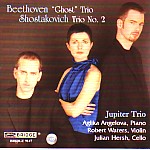Even in a market saturated with first-rate recordings of Beethoven’s “Ghost” and Shostakovich’s E minor piano trios, the exceptionally high standards that the Chicago-based Jupiter Trio set leave a strong impression. In the “Ghost” trio’s outer movements the musicians take Beethoven’s rapid tempo indications at face value, yet they up the emotional ante by means of subtle, tasteful inflections of pulse. What’s more, the sophistication with which they address issues of balance between instruments and unanimity of phrasing always sounds natural and even playful (the first-movement development’s witty canonic interplay, for example). They also manage to convey the slow movement’s spooky, disembodied mood without letting the basic tempo go slack.
By any equation, the Jupiter Trio’s fervent, cohesive, and tonally opulent Shostakovich interpretation does this epic, multi-leveled score proud, especially in how they stage-manage the finale’s dynamics for maximum dramatic impact. My only half-gripe concerns the Scherzo, which is slightly heavy-gaited and studio-bound next to the leaner, quicker, more heated Trio Wanderer recording on Harmonia Mundi (the latter recording more cogently reveals the music’s kinship to its counterpart in the Tenth Symphony). Bridge’s gorgeous, intimate engineering makes you feel like you’re in the middle of the trio as a silent but enthusiastic guest artist. [1/9/2006]
































